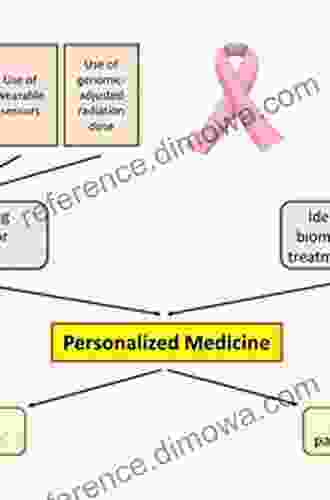Molecular Diagnostics: Unlocking the Key to Personalized Cancer Medicine

Cancer is a complex and multifaceted disease that has a profound impact on individuals, families, and society as a whole. The traditional approach to cancer treatment has been largely based on a "one-size-fits-all" methodology, where patients receive standard treatments based on their cancer type and stage. However, this approach has often led to suboptimal outcomes, as individual patients may respond differently to the same treatment.
In recent years, there has been a paradigm shift towards personalized cancer medicine, which seeks to tailor treatments to the unique characteristics of each patient's tumor. This approach is based on the understanding that cancers are driven by specific genetic alterations, and that these alterations can be identified and targeted with tailored therapies.
5 out of 5
| Language | : | English |
| File size | : | 191051 KB |
| Print length | : | 362 pages |
| Screen Reader | : | Supported |
Molecular diagnostics plays a pivotal role in personalized cancer medicine. These tests analyze the genetic makeup of a patient's tumor, providing valuable information about the molecular drivers of the cancer. This information can then be used to guide treatment decisions, ensuring that patients receive the most appropriate therapies for their individual needs.
The Role of Molecular Diagnostics in Personalized Cancer Medicine
Molecular diagnostics can be used to identify a wide range of genetic alterations in cancer cells, including:
- Mutations in genes that drive tumor growth, such as oncogenes and tumor suppressor genes
- Amplifications or deletions of genes, which can lead to overexpression or underexpression of key proteins
- Translocations, which can create fusion proteins that have oncogenic activity
By identifying these genetic alterations, molecular diagnostics can help to:
- Classify tumors: Molecular diagnostics can help to classify tumors into specific subtypes, which can guide treatment decisions. For example, breast cancer can be classified into different subtypes based on the presence of hormone receptors, HER2 overexpression, and other genetic alterations.
- Predict response to therapy: Molecular diagnostics can help to predict how a patient will respond to a particular treatment. For example, patients with certain genetic alterations may be more likely to benefit from specific targeted therapies.
- Monitor treatment response: Molecular diagnostics can be used to monitor the response to treatment in real time. This information can help to guide treatment decisions and ensure that patients are receiving the most effective therapies.
- Identify new targets for therapy: Molecular diagnostics can help to identify new targets for cancer therapy. By understanding the genetic makeup of tumors, researchers can develop new drugs that are specifically designed to target these alterations.
The Future of Personalized Cancer Medicine
Molecular diagnostics is a rapidly evolving field, and new technologies are emerging all the time. These technologies are making it possible to analyze the genetic makeup of tumors with greater accuracy and speed, which is opening up new possibilities for personalized cancer medicine.
In the future, molecular diagnostics will play an even greater role in personalized cancer medicine. These tests will be used to:
- Develop more effective treatments: By understanding the genetic makeup of tumors, researchers can develop more effective treatments that are specifically targeted to the unique characteristics of each patient's cancer.
- Reduce the risk of cancer: Molecular diagnostics can also be used to identify individuals who are at high risk of developing cancer. These individuals can then be offered preventive measures, such as screening and lifestyle changes, to reduce their risk of developing the disease.
- Improve the lives of cancer patients: Molecular diagnostics has the potential to improve the lives of cancer patients by providing them with more personalized and effective treatments. These tests can help to reduce the side effects of treatment, improve outcomes, and give patients hope for a better future.
Molecular diagnostics is a powerful tool that is transforming the way we diagnose and treat cancer. These tests are providing valuable information about the genetic makeup of tumors, which is helping to guide treatment decisions and improve outcomes for patients. As the field of molecular diagnostics continues to evolve, we can expect to see even more advances in personalized cancer medicine, leading to better outcomes and improved lives for cancer patients.
Image Alt Text
- A doctor using a microscope to examine a cancer cell
- A patient undergoing a molecular diagnostic test
- A graph showing the results of a molecular diagnostic test
5 out of 5
| Language | : | English |
| File size | : | 191051 KB |
| Print length | : | 362 pages |
| Screen Reader | : | Supported |
Do you want to contribute by writing guest posts on this blog?
Please contact us and send us a resume of previous articles that you have written.
 Book
Book Novel
Novel Page
Page Chapter
Chapter Text
Text Story
Story Genre
Genre Reader
Reader Library
Library Paperback
Paperback E-book
E-book Magazine
Magazine Newspaper
Newspaper Paragraph
Paragraph Sentence
Sentence Bookmark
Bookmark Shelf
Shelf Glossary
Glossary Bibliography
Bibliography Foreword
Foreword Preface
Preface Synopsis
Synopsis Annotation
Annotation Footnote
Footnote Manuscript
Manuscript Scroll
Scroll Codex
Codex Tome
Tome Bestseller
Bestseller Classics
Classics Library card
Library card Narrative
Narrative Biography
Biography Autobiography
Autobiography Memoir
Memoir Reference
Reference Encyclopedia
Encyclopedia Jennifer Rush
Jennifer Rush Ana Andjelic
Ana Andjelic A R Vasishtha
A R Vasishtha Michael R Zomber
Michael R Zomber Abraham Adams
Abraham Adams Sarah Govett
Sarah Govett Ankit Kirar
Ankit Kirar Cyan Brown
Cyan Brown Abigail Steel
Abigail Steel Kelsie Stelting
Kelsie Stelting Michael A Messner
Michael A Messner Matthew Vale
Matthew Vale Norman Douglas
Norman Douglas Abhishek Chaudhary
Abhishek Chaudhary N W Harris
N W Harris Christopher P Nichols
Christopher P Nichols Kat Zhang
Kat Zhang Johnnie Walker
Johnnie Walker Mark Berlin
Mark Berlin Ashley Mallett
Ashley Mallett
Light bulbAdvertise smarter! Our strategic ad space ensures maximum exposure. Reserve your spot today!

 Stuart BlairSoaring to New Heights: The World's Best Hang Gliding and Paragliding Cross...
Stuart BlairSoaring to New Heights: The World's Best Hang Gliding and Paragliding Cross...
 Will WardUnveiling the Enigmatic World of Before Fall by Lauren Oliver: A Journey into...
Will WardUnveiling the Enigmatic World of Before Fall by Lauren Oliver: A Journey into... Howard BlairFollow ·10.8k
Howard BlairFollow ·10.8k Lawrence BellFollow ·9.6k
Lawrence BellFollow ·9.6k Juan ButlerFollow ·5.1k
Juan ButlerFollow ·5.1k Peter CarterFollow ·17.7k
Peter CarterFollow ·17.7k Rex HayesFollow ·9.9k
Rex HayesFollow ·9.9k David PetersonFollow ·17k
David PetersonFollow ·17k Efrain PowellFollow ·3.7k
Efrain PowellFollow ·3.7k Leon FosterFollow ·10.7k
Leon FosterFollow ·10.7k

 Julio Cortázar
Julio CortázarShift Your Perspective, Seize Your Potential, Own Your...
A Transformative Guide to...

 Isaias Blair
Isaias BlairPractical Algorithms For 3d Computer Graphics: Unlocking...
In the realm of digital artistry, 3D computer...

 Joseph Heller
Joseph HellerClear Vision Through Cloudy Eyes: A Guide to Overcoming...
Have you ever felt...

 Leo Tolstoy
Leo TolstoyThe True Story of My Fairygodparent Who Almost Killed Me...
Book Description In this captivating...

 Earl Williams
Earl WilliamsCanada 10 Must Visit Locations: A Captivating Journey...
Prologue: A...
5 out of 5
| Language | : | English |
| File size | : | 191051 KB |
| Print length | : | 362 pages |
| Screen Reader | : | Supported |










